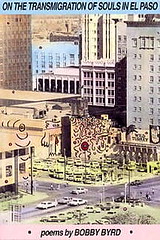
If there is an American Siberia, a land of complete remoteness, my vote goes to anywhere in Texas south of Waco. When you are in El Paso, the trip to San Diego is only 100 miles longer than the trip to Dallas. It would be hard to find a location more well suited to the New Western aesthetic that grew up in the 1960s around the magazine Coyote’s Journal than El Paso. Born on the one hand out of Charles Olson’s theories of line & space, helped along by Ed Dorn, and on the other by the open-ended Zen-based poetics of the likes of Gary Snyder, Phil Whalen & Lew Welch, the New Western mode seemed to attract people who actually wanted to live the life, as distinct from just dress up like it in a New York City coffee house. The downside of that is that you’re more apt to have your work noticed if you can get to St. Marks by walking.
El Paso is where you would find one Bobby Byrd, not to be confused with James Brown’s famed sideman in the Famous Flames, but a poet who did indeed appear in Coyote’s Journal back before editor-in-chief James Koller took the publication off to Maine. Indeed, if you put Byrd alongside Drum Hadley, Bill Deemer, any of the poets mentioned in the above paragraph, or maybe David Meltzer or Larry Goodell, you would find a continuity of style & a commonality of concern quite remarkable, especially considering that Byrd is so far removed even from Hadley, let alone Deemer in the northwest corner of Oregon.
Byrd is still quite active, still producing poetry that is utterly enjoyable. The most recent book of his that I have is On the Transmigration of Souls in El Paso, which was published by Byrd’s own Cinco Puntos Press back in 1992. It is one of those books that makes you painfully aware that there is somewhere a big book to be published of Byrd’s work, one of those volumes that will make a lot of younger readers ask “Why haven’t I heard of this guy before?” Good question.
There is a pun in the title of that book – El Paso being not so far from Spanish for transmigration – that points to an aspect of Byrd’s writing, its wry wit, that will be recognizable to anyone who has read either Whalen or the first two generations of the New York School. Indeed there are titles here – “Things You Can’t Do in Albuquerque or Santa Fe, #11” – that echo, maybe even mock a little, the work of Ted Berrigan. And you can find poems here that, frankly, could have been written anywhere, as in “The End of the 1990 Season.”
It’s Saturday afternoon.
The A’s are playing the Tigers.
Canseco is such an asshole.
Cecil Fielder nails one deep into next year.
But I’m nodding off to sleep anyway.
The phone rings.
It’s Janis Joplin.
She’s lonely.
She wants to come back.
I tell her it’s impossible.
We haven’t progressed far enough yet,
and the Yankees will be in New York forever.
She says she doesn’t want to hear about forever.
What do you want me to do? I ask her.
She doesn’t answer. I tell her
that there’s nothing she can do but wait.
Please wait.
Please.
And please call me back another time.
But not on Saturday afternoon.
I like to take a nap on Saturday afternoon.
That’s a more complex little poem than it first appears, and one that has aged nicely over the past 15 years as the baseball careers of Canseco & Fielder have become as ethereal in memory as the Texas accent of Janis Joplin. She was, it is worth noting, from Port Arthur, which is at the very southeastern corner of the state, just as El Paso is at the southwestern tip – it’s 100 miles further to Port Arthur from El Paso than it is to San Diego.
Or you could walk across the El Paso Street Bridge & suddenly be in Juarez, Mexico, a little jaunt William Carlos Williams once memorialized in The Desert Music. Byrd never actually describes that walk when he writes about it in “Lines Composed on the El Paso Street Bridge”:
William Carlos Williams is dead.
Flossie is dead. Robert McAlmon is dead.
You can study about it in school.
That is a poem that will be luminous to any fan of Williams, recalling not just The Desert Music, but also Paul Blackburn’s great elegy to Williams, which is only slightly longer than Byrd’s.
The range of these poems formally goes from the softer side of Black Mountain aesthetics (think Whalen, or Anselm Hollo) to the New York School, but with a tone that is ultimately distinct from either. Whether that’s El Paso, West Texas, or just Byrd himself is anybody’s guess. But in a poem like “The Broken Coffee Pot,” it’s unmistakable:
Dump the fucker
Shoot it in the head.
Yeah.
Poor thing.
On the Transmigration of Souls in El Paso is still available from Cincos Puntos. At $9.95, it is outrageously underpriced & an absolute steal.






